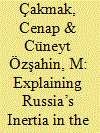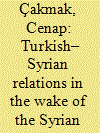| Srl | Item |
| 1 |
ID:
191765


|
|
|
|
|
| Summary/Abstract |
Russia has been conventionally portrayed in the area studies literature as a close ally of Armenia, although the latter is a subordinate rather than an equal partner. More recent scholarship has focused on Armenia’s dilemma as to whether to align itself with the liberal West or to enhance ties with its former patron. The Armenian foreign policy establishment has demonstrated in political action and discourse a marked preference for Europe’s institutions and political vision. Russia’s neutrality in the recent escalation of tension between Armenia and Azerbaijan, despite bilateral security arrangements with Armenia, showed the inherent fragilities of this asymmetric alliance. Drawing on asymmetric alliance literature, this article seeks to explain Russia’s reluctance to involve itself in the Nagorno-Karabakh dispute in favour of Armenia and identifies how Russia rewards or punishes its ally, based on its assessment of whether the ‘side payments’ attached to the alliance have been honoured.
|
|
|
|
|
|
|
|
|
|
|
|
|
|
|
|
| 2 |
ID:
147971


|
|
|
|
|
| Summary/Abstract |
This paper analyses the bilateral relations between Turkey and Syria since the breakout of the popular uprising in 2011, with particular reference to a securitization–desecuritization framework. The author inquires whether Turkish policymakers have securitized the Syrian civil war and framed it in security-laden discourse in the time period under review. Turkey extended strong support to the demonstrations and invested efforts towards a regime change. Assad’s response was unfriendly. Both the Assad regime’s policy vis-à-vis Turkey and the repercussions of the civil war in Syria posed serious threats to Turkish national security. However, based on the analysis of official statements by Turkish authorities during the crisis, the author argues that Turkey avoided framing the Syrian refugee crisis in security terms, whereas border violations, such as the downing of a military aircraft by Syrian regime forces, were defined as threats to national security. The paper further discusses the reasons for Turkey’s selective approach to issues concerning bilateral relations with Syria.
|
|
|
|
|
|
|
|
|
|
|
|
|
|
|
|